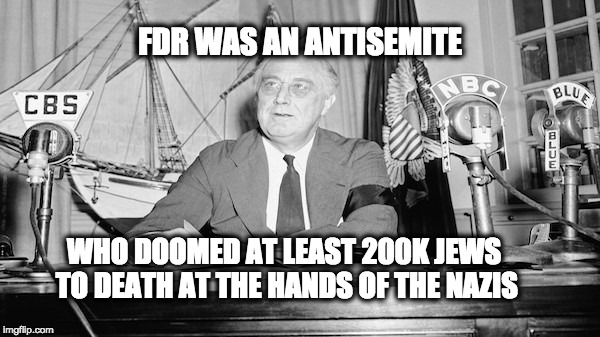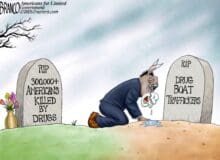Typically, when one asks a Democrat about FDR they immediately develop a sense of awe that reminds me of those little green aliens (undocumented space men?) in Toy Story every time they see Buzz Lightyear.” AHHHHH!”
I’ve never understood the reverence for Franklin Delano Roosevelt. He gets points for picking great Generals and led this country to victory in WWII. But he totally mismanaged the economy, making the great depression longer…in 1937 unemployment spiked again reaching 19% (the previous high was 25%), his freedom-sapping policies never did get this country out of the Great Depression, and don’t forget that he tried to circumvent constitutional separation of powers (now who does that remind me of?). And then there is the issue never discussed, he was a bigot, his hatred of Jews caused hundreds thousands to be added to the ranks of Hitler’s victims.
Winston Churchill’s appeasement of the Palestinian Arabs doomed tens of thousands more.
Some point to the fact he didn’t he bomb and destroy the train tracks that were shipping Jews to the concentration camps? But my opinion sides with the people who say that wouldn’t have worked. The real question to be explored was why didn’t allow more Jews into the country and why didn’t he pressure Britain to allow Jews to move from Nazi controlled areas into what was then called Palestine?
In the book “FDR and the Holocaust: A Breach of Faith,” historian Rafael Medoff suggests that Roosevelt failed to take relatively simple measures that would have saved significant numbers of Jews during the Holocaust, because his vision for America was one that had a small number of Jews. In other words, FDR doomed many Jew to suffer not because he wanted them to die, but because he didn’t want a lot of them living in his neighborhood.
In a piece for the Brandies Center, Medoff shared some of the hateful/public anti-Semitic statements Roosevelt made when he let his guard down:
In 1923, as a member of the Harvard board of directors, Roosevelt decided there were too many Jewish students at the college and helped institute a quota to limit the number admitted. In 1941, he remarked at a Cabinet meeting that there were too many Jews among federal employees in Oregon.
In 1938, he privately suggested that Jews in Poland were dominating the economy and were therefore to blame for provoking anti-Semitism there. In 1941, he remarked at a Cabinet meeting that there were too many Jews among federal employees in Oregon. In 1943, he told government officials in Allied-liberated North Africa that the number of local Jews in various professions “should be definitely limited” so as to “eliminate the specific and understandable complaints which the Germans bore towards the Jews in Germany.”
In 1936, he characterized a tax maneuver by the publisher of the New York Times as “a dirty Jewish trick.” In 1938, FDR privately suggested to Rabbi Stephen S. Wise, the era’s most prominent American Jewish leader, that Jews in Poland were dominating the economy and were to blame for provoking antisemitism there. In 1939, Roosevelt expressed (to a U.S. senator) his pride that “there is no Jewish blood in our veins.” In 1940, he dismissed pleas for Jewish refugees as “Jewish wailing” and “sob stuff.” In 1941, President Roosevelt remarked at a cabinet meeting that there were too many Jews among federal employees in Oregon.
The most detailed of FDR’s statements about Jews was made during his meeting on January 17, 1943, in Casablanca, with leaders of the new local regime in Allied-liberated North Africa. U.S. ambassador Robert Murphy remarked that the 330,000 Jews in North Africa were “very much disappointed that ‘the war for liberation’ had not immediately resulted in their being given their complete freedom.”
(Before the war, when the Jews lived under the colonial French regime, they enjoyed rights similar to French citizens. But when the pro-Nazi Vichy French took over the French colonies in 1940, they stripped Jews of those rights. In 1943, upon the defeat of the Vichyites, the Jews had expected their rights would be restored.)
According to the official record of the conversation (later published by the U.S. government in its ‘Foreign Relations of the United States’ series), the president replied that “the number of Jews engaged in the practice of the professions (law, medicine, etc) should be definitely limited to the percentage that the Jewish population in North Africa bears to the whole of the North African population,” which “would not permit them to overcrowd the professions.”
FDR explained that his plan “would further eliminate the specific and understandable complaints which the Germans bore towards the Jews in Germany, namely, that while they represented a small part of the population, over fifty percent of the lawyers, doctors, school teachers, college professors, etc, in Germany, were Jews.” (It is not clear where FDR obtained those wildly inflated statistics.)
Perhaps his distaste for Jews was the reason, that while there were many actions FDR could have taken to stop or slow down the Holocaust, he didn’t. “He could have quietly permitted the immigration quotas to be filled to their legal limit — that alone would have saved 190,000 lives,” Medoff said.
“He could have pressed the British to open Palestine’s doors to Jewish refugees. He could have authorized the use of empty troop-supply ships to bring refugees to stay in the U.S. temporarily, until the end of the war. He could have permitted refugees to stay as tourists in a U.S. territory, such as the Virgin Islands, until it was safe for them to return to Europe. He could have authorized the bombing of Auschwitz or the railway lines leading to it, which would have interrupted the mass-murder process.”
Asked to respond to the argument that it was better for Roosevelt to focus on winning the war than divert resources to bomb Auschwitz, Medoff said “[b]ombing Auschwitz would not have required any diversion of resources, because U.S. planes were already bombing targets that were less than five miles from the gas chambers, during the summer and autumn of 1944.”
It really goes beyond that. FDR was reluctant to speak out against the impending genocide
On August 25, First Lady Eleanor Roosevelt brought her friend Alice Hamilton, who had recently spent three months in Germany, to Hyde Park to give FDR a detailed eyewitness account of German brutality against the Jews. He still refused to publicly criticize Hitler.
On Roosevelt’s most blatant acts of bigotry involved the St. Louis whose story was recently explained at Constitution.com
On May 13, 1939, the St. Louis set sail from Hamburg, Germany, to Cuba with 937 Jewish refugees on board. Captain Gustav Schroder, a non-Jewish German, was determined to rescue these men, women and children from Nazi Germany. To his dismay, he was forced to return 907 passengers to Europe, landing in Antwerp, Belgium, on June 17, 1939.
Four months before Hitler invaded Poland, officially starting World War II, Jews were fleeing Germany by the thousands. Captain Schroder agreed to take a shipload on his luxury cruise liner to Cuba. Shortly before leaving, he was informed Cuba rejected most of the visas issued to his passengers. He left with them anyway, praying for a miracle.
(…) Upon arrival at Cuba, the St. Louis was not allowed to dock. Captain Schroder worked for a week in vain to allow his passengers to disembark. He was denied. Only 22 Jewish refugees were allowed entry as they did have acceptable passage, along with four Spanish citizens and two Cuban nationals. One gentleman, so distraught over returning to Nazi Germany, attempted suicide. He was taken to a hospital in Havana for treatment for his wounds.
Captain Schroder turned to America, pleading to President Franklin D. Roosevelt for help. Claims of improper paperwork, German Jewish immigration quotas and national security were given as excuses for rejecting the passengers. Afraid Schroder would run his ship ashore in Florida, forcing America to accept the refugees, the Coast Guard was sent to watch the St. Louis as it sailed close to our shores.
Finding no help anywhere in North America, Schroder was forced to return to Europe. Determined to be the liberator of his remaining 907 passengers (as one person died during the voyage), Schroder refused to return his ship to Germany until all the refugees were given protection in other countries. The United States finally stepped in and helped secure those arrangements in European countries.
Once those agreements for asylum were made, Captain Schroder docked his boat in Antwerp, Belgium, on June 17th. The United Kingdom accepted 288 passengers while France welcomed 224, Belgium accepted 214, and the Netherlands received 181. In less than a year, Hitler invaded Belgium and France in May of 1940, again threatening those refugees who for a moment had a taste of true freedom. It is estimated that 254 of the 907 returned to Europe were victims of the Holocaust, loosing their lives in concentration or internment camps.
When Hitler came into power in Germany there was a large increase in the demand for Jewish immigration to Palestine as Jews tried to escape. The British allowed around 50,000 Jews to immigrate from 1934-1936 but it infuriated the Arab population.Based on the higher immigration levels the Arabs started the an intifada against the Palestinian Jews. The Arab attacks continued for three years (1936-1939). Britain did take a stab at limiting the Arab attacks, but it was more important to keep the Arabs from jumping to the German side. So they began the British tradition of appeasing Palestinian terrorists, that exists even today. Their solution was the White Paper of 1939.
The White Paper limited the immigration of Jews to Palestine which resulted in the death sentence. A limit of 75,000 Jewish immigrants was set for the five-year period 1940-1944, consisting of a regular yearly quota of 10,000, and a supplementary quota of 25,000, spread out over the same period, to cover refugee emergencies. After this cut-off date, further immigration would depend on the permission of the Arabs . Restrictions were also placed on the rights of Jews to buy land from Arabs—a restriction that President Obama tried to duplicate.
Today, Yom HaShoah we remember the horror of the Holocaust. It is sad to consider that partly because of Franklin Delano Roosevelt Antisemitism, and Winston Churchill’s appeasement, innocent people who could have been saved were instead abandoned.
ppp






